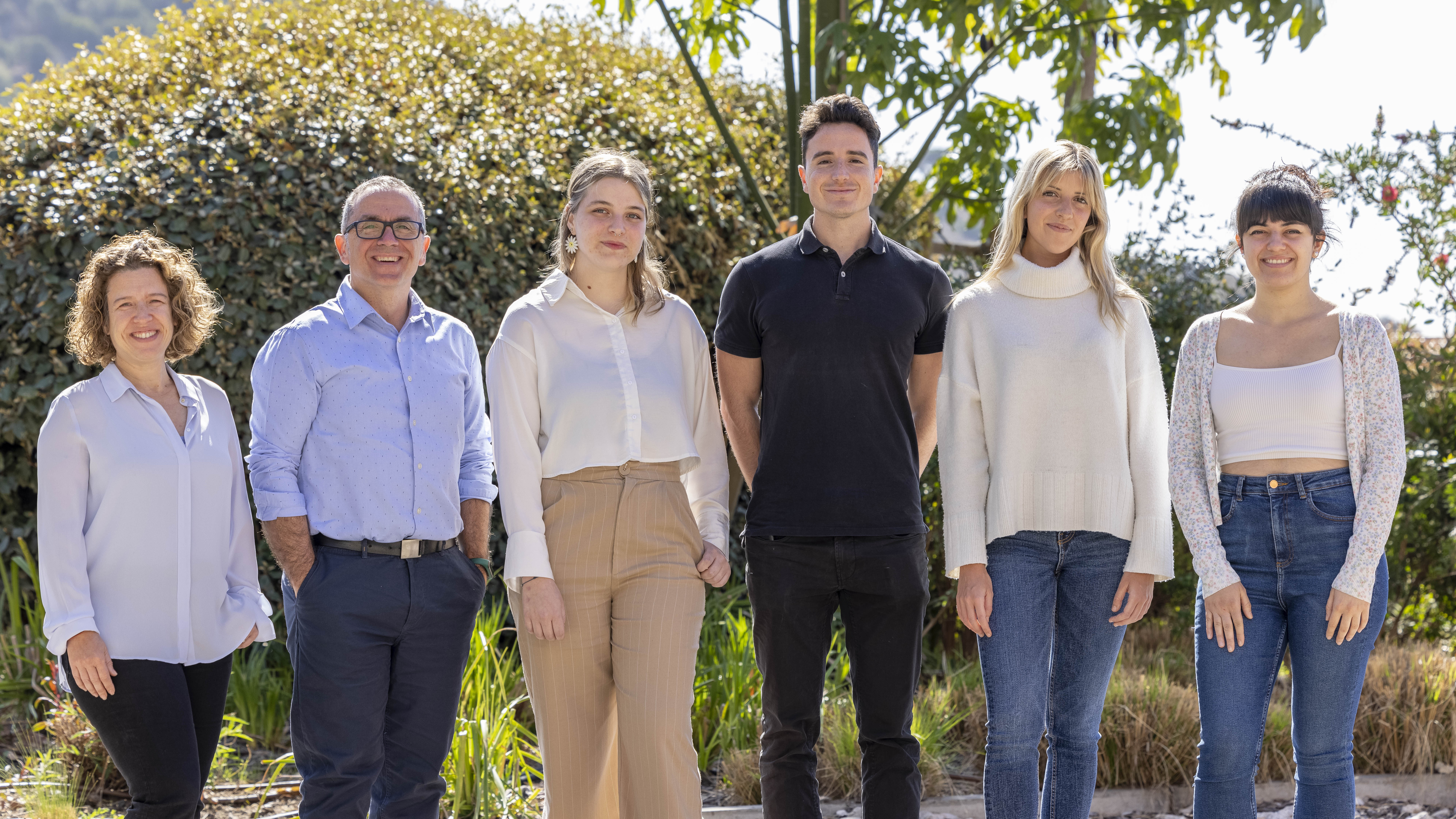About
The Cancer Genetics and Epigenetics (CGE) group studies alterations that impact the development of colorectal cancer (CRC) and gastric cancer, as well as their corresponding tumour phenotypes.
Their studies have extensively investigated DNA hypomethylation of genes and repetitive elements in the very early steps of gastrointestinal carcinogenesis, identifying that aberrant genomic demethylation of the mucosa is a risk factor for gastric and colorectal cancer development. They have also found that hypomethylation of some specific repetitive DNA elements is associated with aberrant genome duplication, which is known to promote chromosomal instability and contribute to the development of gastrointestinal cancers.
The current research of the group aims to explore the molecular mechanisms underlying this association between hypomethylation of those repetitive DNA elements and aberrant genomic duplication, which could reveal fundamental factors in the early stages of tumorigenesis preceding malignant transformation.
The group is also studying epigenetic alterations associated with CRC immunogenicity. Their recent studies have revealed the association between the epigenetic silencing of genes encoding extracellular matrix remodelers and higher lymphocytic infiltration levels in non-hypermutant CRCs. Pharmacological inhibition of these extracellular matrix remodelers could increase tumour immunogenicity, resulting in more abundant lymphocytic infiltration and enhanced response to immune checkpoint inhibitor therapy. This research builds on the group's long-standing interest in DNA methylation alterations affecting extracellular matrix remodelers, which led to the discovery of frequent and coordinated hypermethylation of ADAMTS genes. Additionally, their research has identified methylation alterations in other genes that have a substantial impact on CRC phenotype, they developed microarray-based technologies to analyse genomic methylation and discovered highly specific and sensitive epigenetic biomarkers for biliary cancer detection.
In their research, the CGE team employs an interdisciplinary approach that combines epigenomics, transcriptomics, and genomics, computational analysis, molecular biology, and cell biology. Over the past few years, the group has been actively developing novel, cost-efficient, and scalable in vitro immuno-oncology models for genetic and pharmacological studies aimed at enhancing tumour immunogenicity and improving the response of gastrointestinal cancers to the most recently developed immunotherapies.
Keywords: Epigenomics, gastrointestinal cancer, immuno-oncology, 3D in vitro models.

Group leader
- Sergio Alonso Utrilla, PhD

Sergio Alonso Utrilla, PhD
Sergio Alonso has worked in the field of cancer genetics and epigenetics for nearly two decades. His work has resulted in over 40 scientific publications, showcasing his interdisciplinary expertise in molecular biology, cell biology, computational and statistical high-throughput data analysis. He obtained his PhD in Biochemistry and Molecular Biology at the Complutense University of Madrid in 2002, with internships at the Biotechnology Research Institute in Montreal (1998-99). Following a year of postdoctoral experience at the Center for Biological Research (CIB-CSIC, Madrid), Alonso joined Dr M. Perucho's team at The Burnham Institute for Cancer Research in La Jolla, CA (now Sanford Burnham Prebys Medical Discovery Institute, SBP) as a postdoctoral associate researcher in 2003.
Alonso received the Fishman Fund Award for Exceptional Postdoctoral Researchers in 2006 and was subsequently promoted to Staff Scientist at SBP in 2007. In 2009, he transitioned with Dr Perucho's team to the newly established Institute of Predictive and Personalized Medicine of Cancer (IMPPC) to establish the Laboratory of Cancer Genetics and Epigenetics. IMPPC later merged into Germans Trias i Pujol Research Institute (IGTP) in 2016, where the research activities of CGE have been ongoing, with Alonso assuming leadership in 2019.
Alonso has been an active member of European research networks EuCOLONGENE and TRANSCOLONCAN COST actions, representing CGE. He has also participated in the CRIPREV multicentric PERIS project to identify genetic, epigenetic, and metagenomic biomarkers of CRC risk in medium-risk populations. In 2023, Alonso's group joined the COST action IMMUNO-model (CA21135) to model immunotherapy response and toxicity in cancer.
Contact: salonsou(ELIMINAR)@igtp.cat
ORCID: 0000-0001-6497-892X
Team
Senior researcher (associate investigator)
Beatriz González Alonso, PhD(ELIMINAR)
PhD student
Carlos Mateos Sánchez, MSc(ELIMINAR)
Master's students
Catarina Sofia Ferreira Violante, BSc(ELIMINAR)
Anna Pujol Cano, BSc(ELIMINAR)
Graduate student
Aida Font Cugat, BSc(ELIMINAR)
Undergraduate students
Oscar Manuel Rodriguez Reyes(ELIMINAR)
Delaney Smith(ELIMINAR)
Sergi Herrera González(ELIMINAR)
Research lines
- Epigenetic dysregulation of pericentromeric and subtelomeric regions: association with telomere dysfunction and endoreduplication in the first steps of gastrointestinal carcinogenesis.
- Epigenetic determinants of enhanced tumour immunogenicity in colorectal cancer: towards targeted therapies to improve immunotherapy response.
- Development of cost-efficient and scalable 3D co-culture models for immuno-oncology studies.
Active projects
Extracellular matrix remodelers: association with lymphocytic infiltration and applicability as markers of response to immunotherapy in colon and rectal cancer
PI: Sergio Alonso
Funding agency: Fundación Mutua Madrileña
Duration: September 2020 - October 2024

Role of genomic hypomethylation in spontaneous tetraploidization and chromosomal instability: novel mechanistic insights in the early steps of colorectal oncogenesis
PI: Sergio Alonso Utrilla
Funding agency: Instituto de Salud Carlos III (ISCIII)
Agency code: PI21/01766
Duration: 01/01/2022 - 31/12/2024

Past projects
Remodeladores de la matriz extracelular: asociación con infiltración linfocítica y aplicabilidad como marcadores de respuesta a inmunoterapia en cáncer de colon y recto
PI: Sergio Alonso Utrilla
Funding agency: Fundación Mutua Madrileña
Agency code: AP174232020
Duration: 01/09/2020 - 31/08/2023
Genomic Hypomethylation: Association between aging and cancer through a singular oncogenic pathway
PI: Sergio Alonso Utrilla (as co-PI)
Funding agency: Instituto de Salud Carlos III (ISCIII)
Agency code: PI18/01484
Duration: 01/01/2019 - 31/12/2022
Scientific publications
Highlighted publications
Loi E, Zavattari C, Tommasi A, Moi L, Canale M, Po A, Sabato C, Vega-Benedetti AF, Ziranu P, Puzzoni M, Lai E, Faloppi L, Rullán M, Carrascosa J, Amat I, Urman JM, Arechederra M, Berasain C, Ferretti E, Casadei-Gardini A, Avila MA, Alonso S, Scartozzi M, Zavattari P. HOXD8 hypermethylation as a fully sensitive and specific biomarker for biliary tract cancer detectable in tissue and bile samples. Br J Cancer. 2022 Jun;126(12):1783-1794. DOI: 10.1038/s41416-022-01738-1.
Poppova L, Pavlova S, Gonzalez B, Kotaskova J, Plevova K, Dumbovic G, Janovska P, Bystry V, Panovska A, Bezdekova L, Maslejova S, Brychtova Y, Doubek M, Krzyzankova M, Borsky M, Mayer J, Bryja V, Alonso S, Pospisilova S. Memory B-cell like chronic lymphocytic leukaemia is associated with specific methylation profile of WNT5A promoter and undetectable expression of WNT5A gene. Epigenetics. 2022 Dec;17(12):1628-1635. DOI: 10.1080/15592294.2022.2050004.
González B, Fece de la Cruz F, Samuelsson JK, Alibés A, Alonso S. Epigenetic and transcriptional dysregulation of VWA2 associated with a MYC-driven oncogenic program in colorectal cancer. Sci Rep. 2018 Jul 23;8(1):11097. DOI: 10.1038/s41598-018-29378-7.
González B, Navarro-Jiménez M, Alonso-De Gennaro MJ, Jansen SM, Granada I, Perucho M, Alonso S. Somatic Hypomethylation of Pericentromeric SST1 Repeats and Tetraploidization in Human Colorectal Cancer Cells. Cancers (Basel). 2021 Oct 26;13(21):5353. DOI: 10.3390/cancers13215353.
Vymetalkova V, Vodicka P, Vodenkova S, Alonso S, Schneider-Stock R. DNA methylation and chromatin modifiers in colorectal cancer. Mol Aspects Med. 2019 Oct;69:73-92. DOI: 10.1016/j.mam.2019.04.002.
Additional information
Collaborative networks
IMMUNO-model: Modelling immunotherapy response and toxicity in cancer
The COST Action IMMUNO-model CA21135 aims to foster research and innovation in the field of preclinical immuno-oncology models with the ultimate goal of advancing in the treatment of cancer patients by improving their outcomes and quality of life.
The unprecedented change that immunotherapy has represented in the treatment of cancer is best illustrated by the spectacular results obtained in previously incurable malignancies, such as metastatic melanoma. However, the widespread use of these therapies has been hindered by their limited effectiveness and associated toxicities. A better understanding on the complex interactions between tumor cells and the immune system is strictly required to address these problems, and to develop more effective and safer immunotherapies. However, one of the most important obstacles in immuno-oncology research is the scarcity of preclinical models that faithfully recapitulate human immunity and contribute to identify novel therapeutic targets, characterize biomarkers of therapeutic response and toxicity, and generate reliable data on drug synergies.
IMMUNO-model will bring together European researchers from diverse sectors (academia, clinical, industry) with the common goal of establishing a Network that endorses immuno-oncology research by specifically promoting the sharing, standardization and application of immunotherapy preclinical models. This Action will allow the implementation of a broad, creative and collaborative hub through the organization of community-building activities, the creation of synergies among European and non-European scientists, and the training of future researchers in the field. The ultimate aim of this Action is to contribute to translate novel scientific discoveries into benefits to cancer patients and the society.

Doctoral theses
Title: DNA methylation alterations associated with genome endoreduplication and with tumor-infiltrating lymphocytes in colorectal cancer
Author: Maria Navarro Jiménez
Supervisors: Sergio Alonso Utrilla and Beatriz González Alonso
University: Universitat Autònoma de Barcelona
Date of defense: December 15th 2023
Master’s theses
Title: Characterization of three-dimensional co-cultures of colorectal cancer cell lines
Author: Gisela de Miguel Garcia
Supervisors: Sergio Alonso Utrilla and Beatriz González Alonso
University: Universitat Autònoma de Barcelona
Date of defense: 6 September 2023
Title: Molecular characterization of gastric cancers: genetic mutations, global DNA methylation and presence of cancer-related pathogens
Author: Marta Pérez López
Supervisors: Sergio Alonso Utrilla and Beatriz González Alonso
University: Universitat Pompeu Fabra (UPF)
Date of defense: 25 June 2023
Title: Epigenetic alterations in the JAK3/STAT3 pathway in colorectal cancer
Author: Catarina Sofia Ferrera Violante
Supervisors: Sergio Alonso Utrilla and Federico Herrera
University: Universidade de Lisboa
Date of defense: July 2024
Title: Epigenetic alterations in AOX1, TBX20 and BMP3 associated with increased tumour immunogenicity in colorectal cancer
Author: Anna Pujol Cano
Supervisors: Sergio Alonso Utrilla and Beatriz González Alonso
University: Universitat Autònoma de Barcelona
Date of defense: July 2024
News
Se presenta CARE el Programa Translacional de Investigación en Cáncer del IGTP
CARE, el Programa Translacional de Investigación en Cáncer (Translational Program in Cancer Research), es el primer programa transversal promovido por el Instituto de Investigación Germans Trias i Pujol (IGTP), que quiere ser nexo de investigadores del cáncer interesados a establecer puentes entre la investigación básica y la clínica, con una clara vocación para trasladar al paciente el conocimiento y las herramientas que se generan en el laboratorio.
Financiación para un proyecto centrado en la respuesta a la inmunoterapia para el tratamiento del cáncer de colon y recto
La Fundación Mutua Madrileña ha destinado este año 2,3 millones de euros a ayudar a la investigación médica en España. Entre los 21 estudios clínicos beneficiarios se encuentran cuatro investigaciones que se llevarán a cabo en centros catalanes y que recibirán una financiación total que supera los 540.000 euros. Uno de los cuatro está liderado desde el Instituto de Investigación Germans Trias i Pujol (IGTP), coordinado entre cuatro grupos asociados al Programa de Medicina Predictiva y Personalizada del Cáncer (PMPPC).
Contact
(+34) 93 554 3050 extn: 3063

